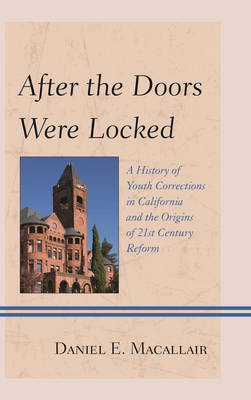
After the Doors Were Locked
Rowman & Littlefield (Verlag)
978-1-4422-4671-3 (ISBN)
The California youth corrections system is undergoing the most sweeping transformation in its 154-year history. The extraordinary nature of this change is revealed by the striking decline in the state’s youth incarceration rate. In 1996, with 10,000 youth confined in 11 state-run correctional facilities, California boasted the nation’s third highest youth incarceration rate. Now, with only 800 youth remaining in a system comprised of just three institutions, California has one of the nation’s lowest youth incarceration rate.
How did such unprecedented changes occur and what were the crucial conditions that produced them? Daniel E. Macallair answers these questions through an examination of the California youth corrections system’s origins and evolution, and the patterns and practices that ultimately led to its demise.
Beginning in the 19th century, California followed national juvenile justice trends by consigning abused, neglected, and delinquent youth to congregate care institutions known as reform schools. These institutions were characterized by their emphasis on regimentation, rigid structure, and harsh discipline. Behind the walls of these institutions, children and youth, who ranged in age from eight to 21, were subjected to unspeakable cruelties. Despite frequent public outcry, life in California reform schools changed little from the opening of the San Francisco Industrial School in 1859 to the dissolution of the California Youth Authority (CYA) in 2005.
By embracing popular national trends at various times, California encapsulates much of the history of youth corrections in the United States. The California story is exceptional since the state often assumed a leadership role in adopting innovative policies intended to improve institutional treatment. The California juvenile justice system stands at the threshold of a new era as it transitions from a 19th century state-centered institutional model to a decentralized structure built around localized services delivered at the county level.
After the Doors Were Locked is the first to chronicle the unique history of youth corrections and institutional care in California and analyze the origins of today’s reform efforts. This book offers valuable information and guidance to current and future generations of policy makers, administrators, judges, advocates, students and scholars.
Daniel E. Macallair is the Executive Director and co-founder of the Center on Juvenile and Criminal Justice. Macallair’s expertise is in the development and analysis of youth and adult correctional policy. He has implemented model community corrections programs and incarceration alternatives throughout the country and is an expert on criminal justice reform. Macallair serves on the faculty of the Department of Criminal Justice Studies at San Francisco State University as a Practitioner-in-Residence, where he teaches courses on adult and juvenile corrections policy. He is also an author of numerous publications and an invited speaker at conferences and seminars throughout the country.
Foreword: Honorable Tom Ammiano, Former Chair, Assembly Public Safety Committee
California State Legislature
Preface: Tim Silard, President, Rosenberg Foundation
Acknowledgments
Introduction: Juvenile Justice in Historical Perspective by Randall G. Shelden
PART I: THE SAN FRANCISCO INDUSTRIAL SCHOOL AND THE ORIGINS OF YOUTH CORRECTIONS IN CALIFORNIA
1 The Industrial School’s Historical Roots
2 The Founding of the San Francisco Industrial School
3 Reorganization and Reform
4 New Legal Procedures and Jurisprudence
5 New Approaches and the Birth of Probation
6 The Industrial School’s Legacy
PART II: CALIFORNIA ENTERS THE REFORM SCHOOL ERA
7 The California State Penological Commission and the Search for New Approaches
8 Founding of the California Juvenile Court
9 The Whittier State School and the Realities of Institutional Life
10 The Introduction of Intelligence Testing at Whittier and the Emergence of Eugenics
11 Preston and the George Junior Republic Experiment
12 The Establishment of the California School for Girls
13 Preston in the 1920s and 1930s
14 California Commission on the Study of Problem Children and the Reaffirmation of Institutional Care
15 The 1930s: The Decade of Complacency and the End of an Era
PART III: FROM REFORM SCHOOL TO CORRECTIONAL SYSTEM: THE CREATION OF THE CALIFORNIA YOUTH AUTHORITY
16 The Death of Benny Moreno
17 The Death of Edward Leiva and the Lindsey Committee
18 The Lindsey Report: Pulling Back the Curtain on Institutional Care
19 The Birth of the California Youth Corrections Authority Act
20 Expansion into the 1950s
21 The Birth of Community Treatment
PART IV: THE YOUTH AUTHORITY’S DECLINE AND FALL
22 Changing Politics of the 1970s and 1980s
23 The Path toward More Punitive Justice
24 The Commonweal Hearings
25 The Farrell Litigation and the End of the Youth Authority Era
26 Returning to the Past: Reviving the Doctrine of Institutional Care
PART V: CONCLUSION
Afterword: Chet P. Hewitt, President & CEO, Sierra Health Foundation
| Einführung | Randall G. Shelden |
|---|---|
| Verlagsort | Lanham, MD |
| Sprache | englisch |
| Maße | 160 x 238 mm |
| Gewicht | 653 g |
| Themenwelt | Geisteswissenschaften ► Geschichte ► Regional- / Ländergeschichte |
| Recht / Steuern ► EU / Internationales Recht | |
| Recht / Steuern ► Strafrecht ► Besonderes Strafrecht | |
| Recht / Steuern ► Strafrecht ► Kriminologie | |
| ISBN-10 | 1-4422-4671-5 / 1442246715 |
| ISBN-13 | 978-1-4422-4671-3 / 9781442246713 |
| Zustand | Neuware |
| Informationen gemäß Produktsicherheitsverordnung (GPSR) | |
| Haben Sie eine Frage zum Produkt? |
aus dem Bereich


